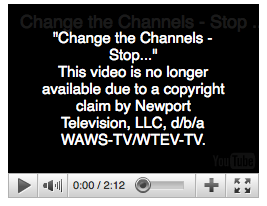Will the new copyright-policing deal become the Heckler’s Veto?

There’s a concept in the law of free speech known as “the Heckler’s Veto.” It’s the idea that if a speaker creates such a stir that he is silenced to avoid enraging the audience—perhaps to the point of violence—then the audience, and the most unhinged among them, gets to determine the limits of free speech.
In the United States, that sort of thing is generally frowned upon.
However, this very thing happens often on the Internet, where claims of "copyright infringement" are used to shut down entire websites, or parts of them, without ever having to face a judge and make a case.
It happened this week to Free Press, when our Change the Channels campaign ruffled the feathers of Newport Television, a media company that "owns, operates, and programs or provides sales and other services" to 56 TV stations in 24 markets.
Change the Channels seeks to publicly expose TV stations that cynically circumvent FCC ownership rules intended to foster diversity and competition by entering into “joint operating agreements,” whereby one station essentially runs at least a portion—often the news department—of another, which is basically a shell company. These broadcasters claim to be following the FCC rules that prevent one owner from dominating a local media market. But in effect, these arrangements egregiously violate the spirit, and sometimes the letter, of the rules. We call this practice "covert consolidation."
We pointed out Newport's "providing sales and other services" created a quasi-merger between WTEV-TV and WAWS-TV in Jacksonville, Fla. A video showing near identical content on the supposedly independent stations' websites was featured on YouTube and embedded on the Free Press website. Rather than argue the merits, Newport filed a copyright claim, and YouTube shut down the video.
Not that I, and certainly not Free Press, have any love for copyright infringement. We firmly believe that creators of content should be justly compensated for their work. But under copyright law generally, there is an allowance for socially beneficial uses, known as the Fair Use doctrine. Simply put, this allows for the educational or public interest use of portions of a copyrighted work, so long as it doesn’t unduly, negatively impact the marketability of the work. This is considered by most in the legal community to be a pretty equitable result: the public debate is enhanced while the creator’s interest in compensation is protected. This is the doctrine that allows Free Press to show samples of Newport's copyrighted material and discuss the public issues that it raises: Is it violating FCC rules and harming the public interest?
We are worried, however, that a virtual “heckler’s veto” could become standard operating procedure online.
The White House is celebrating a purported anti-piracy measure that makes internet service providers- generally big cable or phone companies like AT&T or Comcast- the chief copyright enforcers on the web? It seems like a recipe for corporate censorship, carried out by private parties at the behest of other private parties, often corporations with a demonstrated history of cherishing profit far more than anything quite so quaint as freedom of speech.
As ars technica’s Nate Anderson notes, the new copyright enforcement deal puts ISPs in a position to impose penalties on end users at the mere accusation that they are infringing on copyright, without any requirement of due process or Fair Use expertise on the ISP’s part, and apparently, no recourse against copyright claims brought for the purpose of silencing or harassing critics. Which is precisely what Newport did.
Interestingly, the cease-and-desist letter we received from Newport, from both stations, came from the lawyer for Newport, which owns WAWS-TV, but not (purportedly) WTEV-TV. From a legal standpoint, only the copyright holder can enforce its right. So unless WAWS-TV and WTEV-TV are the same legal entity, it looks as though someone might be trying to protect a copyright to which they have no claim.
It’s hard to blame YouTube under these circumstances; the Digital Millennium Copyright Act places an obligation on service providers to remove supposedly copyright-infringing materials or face liability for failing to do so. But that knee-jerk reaction has effectively silenced Free Press in the discussion of the covert consolidation issue. By merely showing the image of WTEV’s and WAWS’s websites in a non-profit debate of a public issue, Free Press subjected itself to the heckler’s veto. And without having to make a legitimate legal argument or prove the merits of its claim, Newport Television was able to gag a critic.
Free Press, of course, is going through the appropriate procedures to lift the copyright-based censorship and raise awareness of the dirty little secret of covert consolidation. Newport’s claim is laughably weak and Free Press’ use of the material falls squarely within Fair Use. We are lucky to have a strong legal team to beat back Newport’s spurious claims. Even so, we’ve been advised that the soonest our video will reappear on YouTube is “between 10 and 15 days from [July 8].”
But what of those internet users without the resources to challenge the claims by corporate copyright holders who would like to shut up anyone who has anything bad to say, or even tough questions to ask, about them?
This new corporate agreement between copyright owners and ISPs smells of a for-profit star chamber, where claims of infringement are ruled upon by one interested party on behalf of another. Any “justice” that could come out such a system should be viewed skeptically. And any such system is one that should offend every American who believes in the value of public debate.